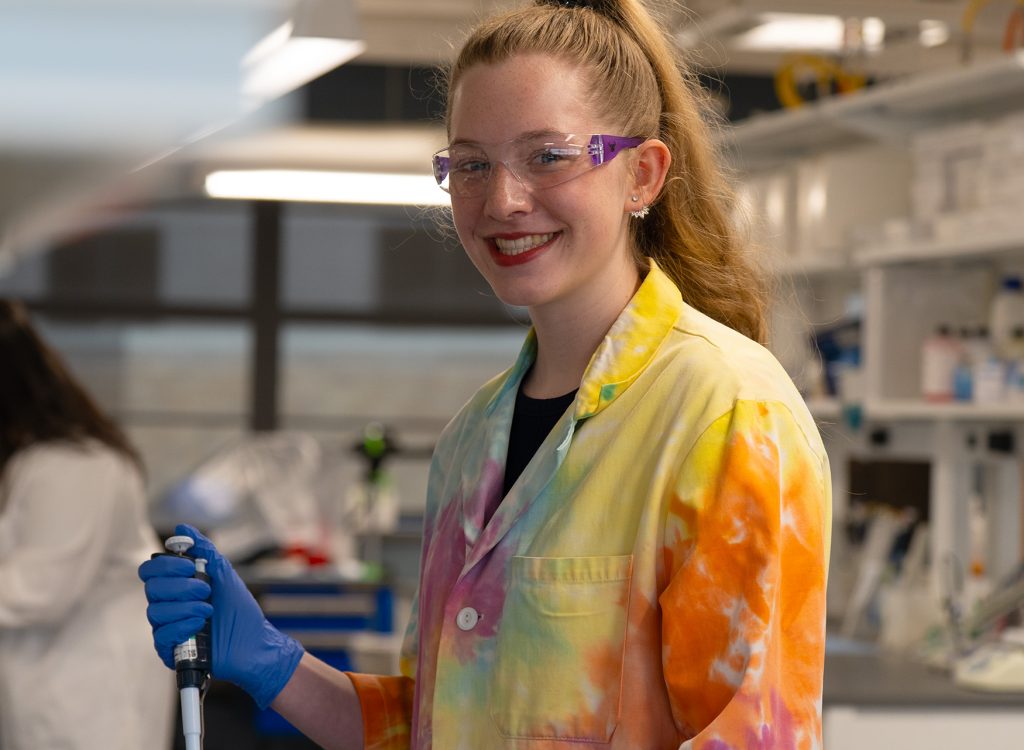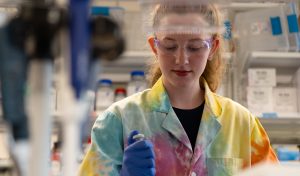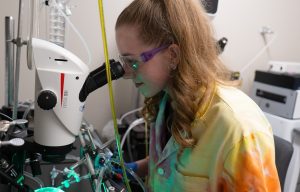
Story and photos by Logan Jackson
- Ava Fleury – junior biochemistry major
- Mentor: Timothy L. Domeier, associate professor of medical pharmacology and physiology; Margaret Proctor Mulligan Professorship in Medical Research
Ava Fleury was a young child when her mother suffered a health scare. Her mother was thankfully able to pull through, and as she grew up, the experience motivated Fleury to look at careers in the medical field. She took advantage of learning opportunities throughout mid-Missouri, such as the Mizzou Mini Medical School, a week-long program where high school students can preview what medical school looks like.

Those experiences only strengthened Fleury’s interest in medicine, and she wanted to continue on that pathway when she enrolled at Mizzou two years ago. Fleury has spent nearly two years conducting undergraduate research, including leading her own project this summer through the Cherng Summer Scholars program.
“Research has always been interesting to me because I have a passion for learning and answering questions,” said Fleury, a junior biochemistry major. “It’s extremely gratifying to know that the scientific discoveries that we make could potentially help advance the knowledge of the field.”
A nine-week research or creative scholarship program for Mizzou students who are pursuing the Honors Certificate, the Cherng Summer Scholars program allows students to participate in individually designed projects under the mentorship of a Mizzou faculty member. The program, which also includes a weekly course, is supported by a gift from Peggy and Andrew Cherng and the Panda Charitable Foundation.
“I’m so grateful for the financial support because it’s allowed me to solely focus on research,” Fleury said. “I’ve also enjoyed talking to students in different fields through the course. We all come from different backgrounds and are working on different projects in distinct disciplines, but we learn through the program to embrace these differences and bring unique perspectives to the table to generate new ideas.”

Fleury is part of the Cardiac Cell Physiology laboratory. The laboratory investigates how heart muscle function changes during heart disease, which is the number one cause of death in the United States. Fleury’s research this summer is focused on exploring the connection between atrial fibrillation and sleep apnea. Fleury said that for muscle cells to contract, like those in your heart, there are certain ions that must move in and out of those muscle cells. They must be precisely coordinated in order for the heart to beat rhythmically. If the flow of ions is uncoordinated, the heart starts to beat arrhythmically.
“Atrial fibrillation is very, very common, and while it’s not immediately deadly, it can lead to other problems like blood stagnation in the heart, which can lead to blood clots and stroke,” Fleury said.
Sleep apnea is also a common disorder, where breathing constantly stops and starts during sleep. The airway actually collapses or gets blocked in the most common type of sleep apnea.
“I am looking more into how the movement of ions in heart cells, specifically calcium, is impacted during obstructive sleep apnea,” Fleury said. “Being in the lab has given me the opportunity to learn so much about calcium handling and the heart.”